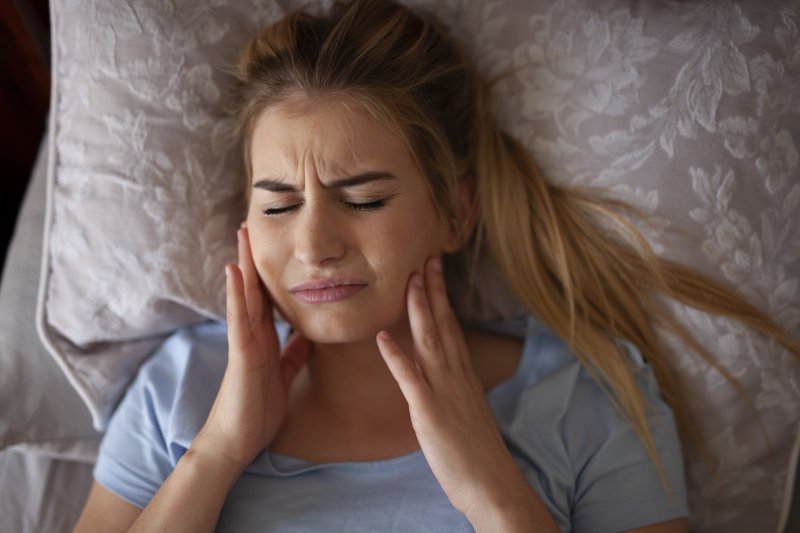
Do you suffer from chronic jaw pain? Are you tired of waking up with severe headaches? It could be that you are prone to bruxism, also known as teeth grinding. This common dental problem plagues millions of children and adults every year and if left untreated, it can cause increased jaw pain that results in TMJ. If you’re ready to take charge of your oral health and find a solution to your problem, spend some time learning more about the connection between temporomandibular joint disorder and teeth grinding as well as what you can do to achieve lasting relief.
TMJ and Teeth Grinding: What’s the Connection?
It should come as no surprise that these two often go hand-in-hand. When grinding or clenching your teeth, you will discover that your temporomandibular joints become tight. These exist on both sides of your jaw and connect it to the rest of your facial structure. Should you begin to grind your teeth, these joints will tighten and lead to:
- Severe headaches
- Difficulty opening and closing your jaw
- Excessive wear and tear on your teeth
- Ear pain
- Should and neck soreness
- Lockjaw
While these are closely associated with teeth grinding, they are also indicators of TMJ. To avoid worsening conditions and prevent increasing pain, your dentist will need to provide TMJ therapy in the form of a nightguard.
How Can a Nightguard Improve Your Oral Health?
A nightguard looks similar to a traditional mouthguard. If you’re wondering why an oral device you wear while playing sports can help minimize bruxism and improve your smile, it’s because they are not exactly alike. In fact, a nightguard is designed to protect your teeth from coming into contact with each other while you sleep.
These custom-made devices are created to comfortably fit your mouth and reduce any TMJ-related pain and discomfort. While wearing your nightguard, the pressure you normally place on your teeth will decrease and as a result, relax your jaw muscles and joints.
Since most patients with TMJ and bruxism tend to experience increased stress, it is important that you identify ways in which you can relax and decrease the tension and anxiety that is causing you to grind your teeth. Some of the most common changes a person can make include:
- Incorporating exercise into your daily routine
- Practicing meditation
- Speaking to a counselor
- Limiting your caffeine or alcohol intake
When undergoing TMJ therapy, you will notice a dramatic difference in the way you feel. Not only will your smile improve, but you will feel less tension in your face, neck, shoulders, and head – all of which will contribute to greater health and wellbeing.
About the Author
Dr. L. Blaine Kennington and his team at Cowlitz River Dental want you to be free of chronic jaw pain. If you suffer from bruxism and/or TMJ, let us help release the tension and pressure that is causing wear and tear on your teeth and increasing discomfort in your jaw joints. With TMJ therapy, you can begin to notice a difference in your smile and overall wellbeing. Using a customized nightguard to act as a barrier between your teeth while you sleep, this safe and effective device will give you the solution you need to improve your smile. If you want to learn more about teeth grinding and whether you are a candidate for TMJ therapy, visit our website or call (360) 274-9100.
